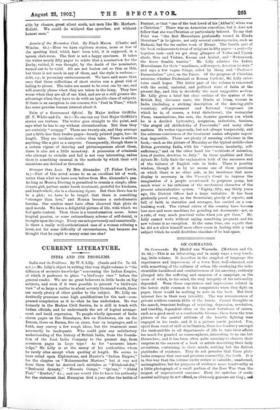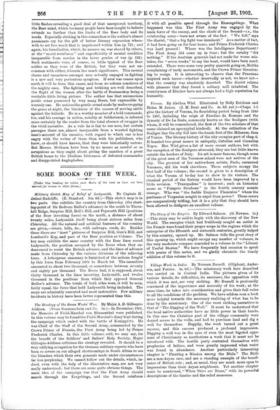ON COMMANDO.
On Commando. By Dietlof van Warmelo. (Methuen and Co. 3s. 6d.)—This is an interesting, and in many ways a very touch- ing, little volume. It describes in the simplest of language the experiences and impressions of a town Boer, well educated, and with something of the softness of urban life overlaying the inde- structible hardihood and combativeness of his ancestry, suddenly plunged into the suffering and suspense of a campaign, on the issue of which, to his mind, the very integrity of his nationality depended. Were these experiences and impressions related in the heroic style common to his compatriots when they fight on paper, there would be nothing to note in the book. But their interest lies in their very trivialit3 . The war reminiscences of private soldiers contain little of the heroic. Casual thoughts on the march, transient feelings of rejoicing, depression, resolution, and timidity, dependent often on the most fortuitous of causes, such as a good meal or a comfortable bivouac, these form the true picture of the mental attitude of the humble fighting man engaged in his trade, and it is a picture rarely painted. For, apart from want of skill or inclination, there is a tendency amongst the rank-and-file in all departments of life to take their affairs too much for granted as commonplaces, interesting to no one but themselves, and it has been often quite amusing to observe their surprise at the success of a book or article describing their daily avocations, containing, to their minds, nothing but the flattest platitudes of existence. They do not perceive that these plati- tudes compose that rare and precious commodity, the truth. It is in this way that the volume under review is valuable ; unadorned, unimaginative, but for purposes of evidence more trustworthy as a little photograph of a small portion of the Boer War than the largest of impressionist canvases. Even its snatches of senti- mental soliloquy do not offend, so obviously genuine are they; sad little flashes revealing a good deal of that unexplored territory, the Boer mind, which too many people have been taught to believe extends no further than the limits of the Boer body and its needs. Especially striking in this connection is the author's almost passionate cry for the gift of better literary expression where- with to set free much that is imprisoned within him (p. 72) ; and again, his humiliation, which, he assures us, was shared by others, at the "moral numbness" and superficiality of mental condition inseparable from service in the lower grades of war (p. 132). Such sentiments were, of course, as little typical of the Boer soldier as they were of the British, but they were not un- common with either, wherein lies much significance. This mental shame and uneasiness amongst men actually engaged in fighting is a new and very portentous symptom. If ever war ceases upon earth it will be from this cause, and from no solemn conclaves of the mighty ones. The fighting and trekking are well described, the flight of the women after the battle of Bosmanskop being a veritable little living picture. The author has that unconscious poetic sense possessed by very many Boers, but expressible by scarcely one. He notices the gentle sound made by mules cropping the grass at night, the blackness of the masses of moving cattle against the hillside. He is a worthy member of a bold commando, .too, and his courage in action, notably at Selikatsnek, is inferred more certainly by the reader from the total absence of swagger in the vivid narrative. As a rule he is fair to our men, but certain passages there are, almost inseparable from a worsted fighting man's account of his enemies, with regard to which one is less angry with the writer of them than with his publishers, who knew, or should have known, that they were historically untrue. But Messrs. Methuen have been by no means as careful or as scrupulous as they ought about giving the sanction of a great British house to the libellous bitterness of defeated commandos and disappointed Anglophobes.







































 Previous page
Previous page